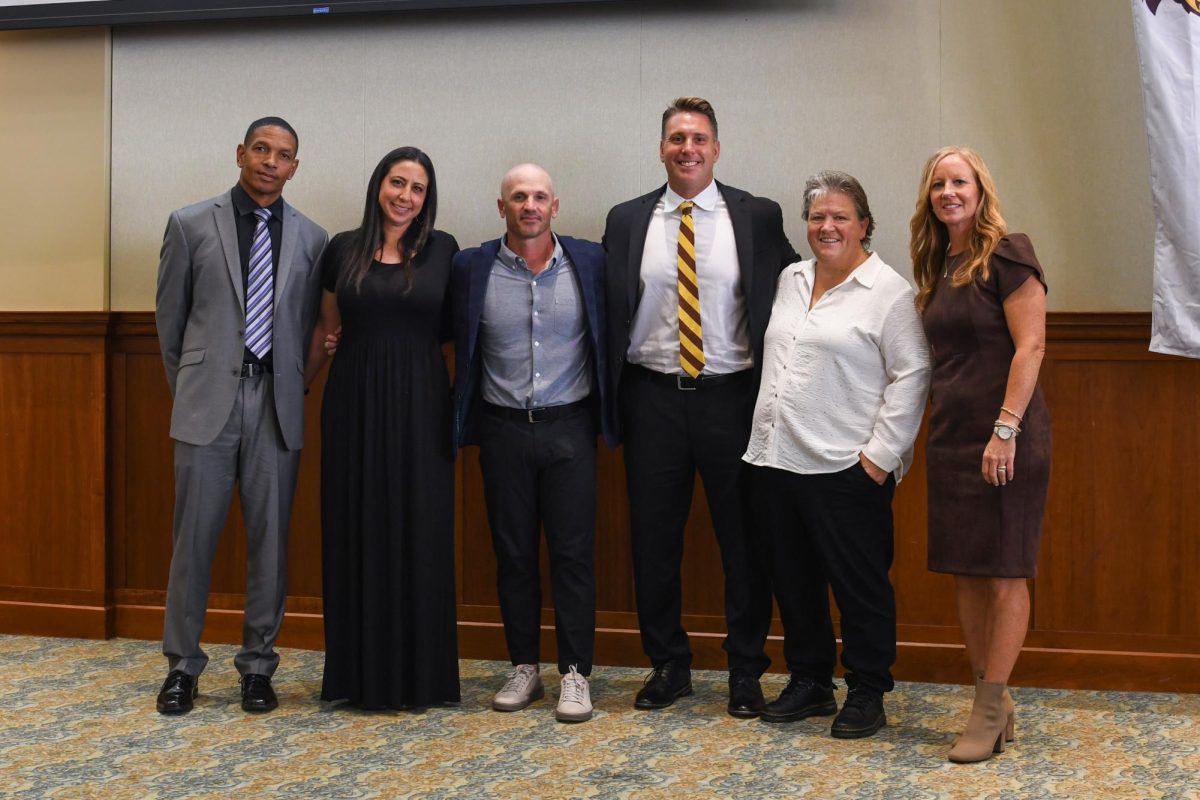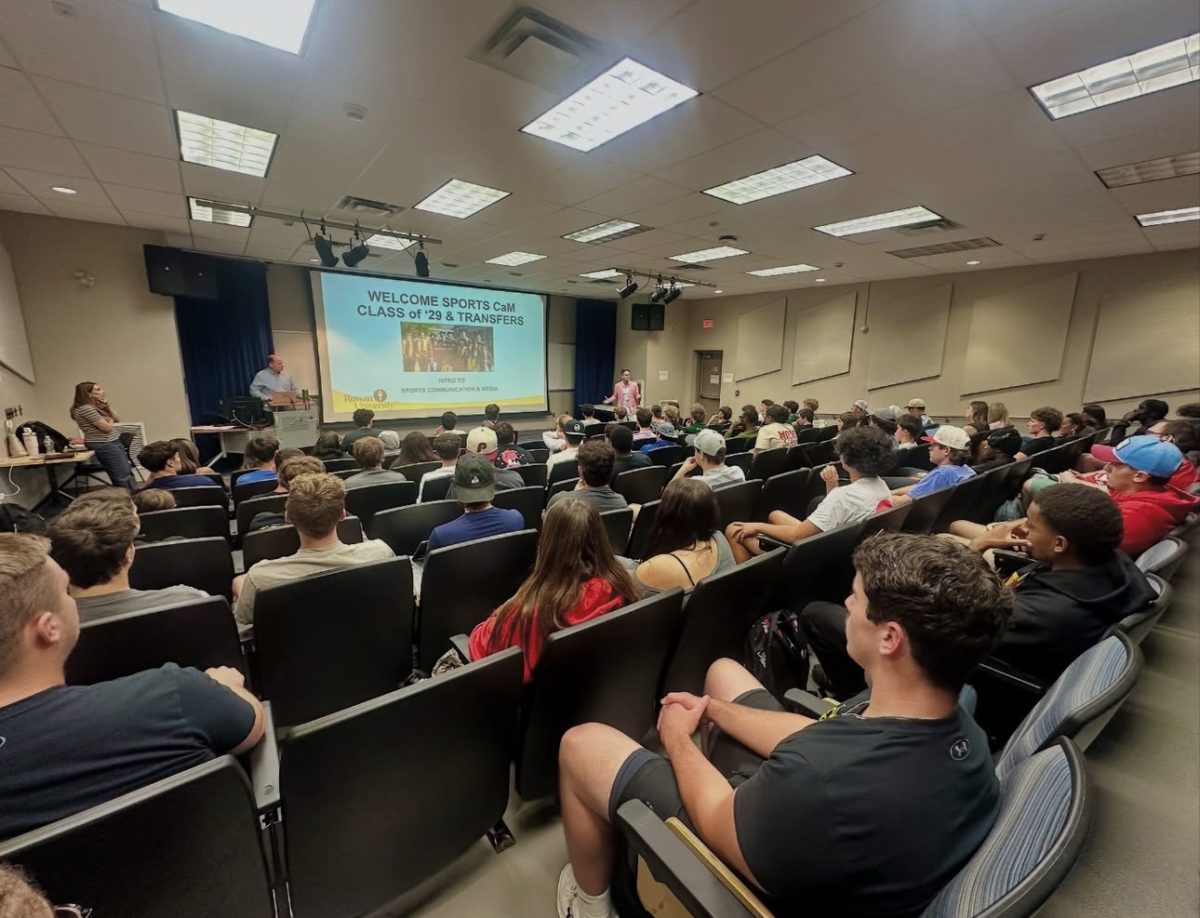On Monday, March 28, Rowan University welcomed Dr. Douglas Brinkley to the Eynon Ballroom in the Student Center to discuss Richard Nixon and the Watergate Scandal for the 50th anniversary.
The event was sponsored by the Office of President, the Department of History, the College of Humanities and Social Sciences, the College of Communication and Creative Arts, and the Rowan Institute for Public Policy and Citizenship, according to the announcer.
Brinkley is a history professor at Rice University, a prolific author, and is featured on CNN as their presidential historian. Brinkley’s books, which have won him numerous awards, look at significant American figures such as Theodore Roosevelt, Walter Cronkite, Rosa Parks, and others.
“I was tasked, for good reason, to come talk [about] Richard Nixon. Not always everybody’s favorite topic, but the timing is really important because we are coming upon the 50th anniversary this June 17 of the break-in of Watergate, which was where the Democratic National Committee was,” Brinkley said.
Watergate started when five burglars were arrested and found with cash that was connected to CREEP (The Committee to Re-elect the President). A total of 69 people were indicted over Watergate with 48 people getting convicted, Brinkley noted.
“So it was a big deal. Watergate really jarred the country,” he said.
Growing up, both of Brinkley’s parents were teachers.
“My mom taught English and my dad taught social studies,” Brinkley said. “We didn’t have a lot of money, but we had time off in the summer, and my parents would take me to historic sites. So I started getting interested in U.S. history from those road trips. I was terrible at math, modestly okay in science, but I had a great aptitude for English in history and I liked writing.”
His mother forced him and his sister, who is a reporter for ABC News in San Francisco, to take public speaking, which made him enter the world of television, but his job never truly felt like a job.
“I’m just doing what I feel like doing, which is studying and reading books on U.S history,” Brinkley said.
Brinkley was a history major while attending Ohio State University.
“I decided I wanted to be a professional historian. Then I went on to my master’s and a doctorate in history, and I have zero regrets. It’s been the best life being a professional historian,” Brinkley said.
In his discussion, Brinkley started with Nixon’s early life, where he had a “chip on his shoulder” from living in “modest circumstances.”
“Nixon was accepted at Harvard, but couldn’t go because he didn’t have money for a train ticket to go east and had to stay and take care of his father’s business,” Brinkley said. “Nixon develops a lifetime animosity [towards] Ivy League schools, the eastern elites, and has a chip on his shoulder that ‘I didn’t get these breaks like the Kennedys.’ So, he just had that problem.”
When Nixon lost against JFK, he never forgave him.
“In 1968, Nixon could have done what Trump did, but he accepted his defeat when there was evidence of corruption in Illinois, Texas, and cemetery votes. Nixon thought it would hurt the country if he did what Trump recently did,” Brinkley said.
Nixon was considered a “geek.”
“I only mention this because when you listen to the Nixon tapes, you’re hearing him curse over and over again, and it’s all fake. It’s all fake macho-ism. He compensated by talking like a rough movie figure and it killed him in this case,” Brinkley said.
The Nixon tapes, in which Brinkley described some of the things on the tapes as horrific, contained audio that was recorded in the White House. Nixon refused to burn them because he wanted to be like Winston Churchill.
“They are endless, racist, anti-semitic rants that I can’t even repeat here. Horrible things. It’s the President of the United States saying all this heinous stuff, there’s no rehabilitation,” Brinkley said.
In the 60s, Nixon became the nominee even though he was “the most square politician you could invent.”
“The tragedy of Richard Nixon begins in 1969 because he didn’t get us out of the Vietnam War,” Brinkley said, calling it his “golden opportunity.”
“If Nixon could have pulled us out of the Vietnam War in ‘69, that would have done a lot to bring his critics down. But instead, Nixon took the attitude ‘I’m not losing in Vietnam’ and continued to escalate,” Brinkley said.
Nixon, however, began to redeem himself, to where his reelection win would have been a guarantee.
“He didn’t need to break into the Democratic National Convention, the Democrats were in disarray,” Brinkley said. “I would not call him a political failure from 1969 to 1971. We could deal with the Vietnam issues and others, but from a raw political point of view, he won big. In ‘71 and in ‘72 he started to tape his genius.”
After the break-in, CBS tried to make Nixon look guilty, but the public didn’t respond.
“In January, the plot thickens, and it’s discovered that all of those [people who broke in] had these ties to Nixon’s reelection,” Brinkley said. “Nixon found that he would have to go to trial if he decided to move forward. If he goes to trial, he’s gonna be charged with felonies. So, he makes a deal of some sort with his Vice President Gerald Ford.”
Nixon resigned to avoid criminal charges.
Watergate also changed history within journalism.
“Watergate is a giant moment in the annals of journalism history,” Brinkley said. “It showed you that as a cub reporter, a young reporter if you have tenacity and will, you can bring down a President of the United States.”
For comments/questions about this story tweet @TheWhitOnline or email [email protected].









































































































































































































